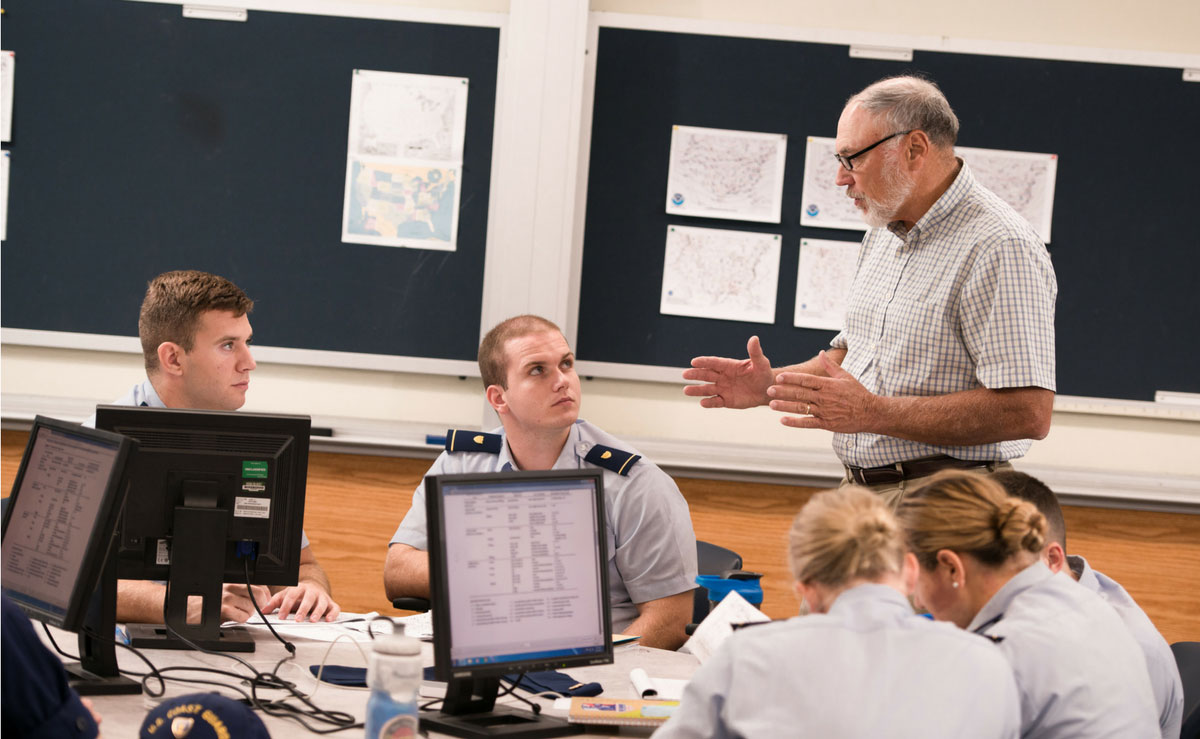
Marine and Environmental Sciences Curriculum
Below is a sample plan of study for a Marine and Environmental Sciences (MES) major. MES majors specialize in one of three major area electives: Environmental Science, Marine Science, or Environmental Monitoring. Each area includes courses with hands-on field and laboratory work. The Environmental Monitoring plan of study is shown below as an example, but there are other additional plans of study shown below.
FOURTH CLASS YEAR (Freshman)
Fall Semester
- Chemistry I
- College Composition
- American Government
- Calculus I
- Fundamentals of Navigation
Spring Semester
- Chemistry II
- Physics I
- Calculus II
- History of the USCG
- Introduction to Computing
- Cultural Perspectives
THIRD CLASS YEAR (Sophomore)
Fall Semester
- Physics II
- Marine Biology
- Oceans I – Air and Sea
- Multivariable Calculus
- Applications in Navigation Lab
- Organizational Behavior and Leadership
Spring Semester
- STEM Elective
- Geospatial Science I
- Oceans II – Land and Sea*
- Ships and Maritime Systems
- Macroeconomics
SECOND CLASS YEAR (Junior)
Fall Semester
- Analytical Methods in Chemistry*
- Ocean Dynamics*
- Remote Sensing*
- Criminal Justice & Maritime Operational Law
- Probability and Statistics
Spring Semester
- Capstone I
- Ethics
- Maritime Watch Officer
- Energy Physics*
- Track Elective*
- Free Elective*
FIRST CLASS YEAR (Senior)
Fall Semester
- Capstone II
- Marine Ecology
- Global Studies
- Cyber Technology
- Climate Change Physics*
- Track Elective*
Spring Semester
- Capstone III
- Science Ethics Seminar
- Environmental Policy and Law
- Professional Maritime Officer
- Track Elective*
- Free Elective*
Marine and Environmental Sciences Concentrations (Taken as Major Area Elective, MES Elective, or Free Elective)
- Environmental Science
- Oceans II – Land and Sea
- Geospatial Sciences II
- Analytical Methods in Chemistry
- Ocean Dynamics
- Remote Sensing
- Waves, Tides, and Coastal Processes
- Climate Change Physics
- Energy Physics
For full details, see the Course Catalog.
- Environmental Science
- Organic Chemistry I
- Organic Chemistry II
- Analytical Methods in Chemistry
- Biochemistry
- Environmental Policy and Law
- Marine Ecology
- Emergency Management
- Fate and Transport of Chemicals in the Environment
- Toxicology
- Microbiology
For full details, see the Course Catalog.
- Oceans II – Land and Sea
- Fisheries Biology
- Biological and Chemical Oceanography
- Fisheries Management
- Ocean Dynamics
- Marine Forecasting
- Waves, Tides, and Coastal Processes
- Polar Oceanography
- Geospatial Sciences II
- Remote Sensing
- Emergency Management
- Intel and Cyber Ops
For full details, see the Course Catalog.
